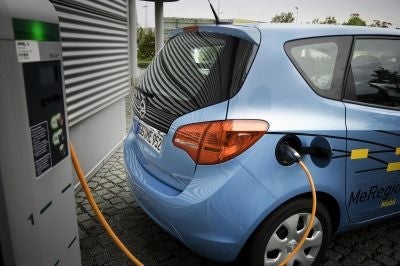General Motors-owned automaker Opel has provided three electrified Merivas as part of an experiment to study the "intelligent charging" technology of the future.
While electric vehicles due to hit the roads in the coming months (such as the Nissan Leaf, Mitsubishi i-MiEV and Chevrolet Volt) take electricity from the grid to charge, it's thought that in the future electric vehicles will play more of a two-way role in the electricity grid.
The prospect of having millions of powerful batteries (in electric vehicles) connected to our electricity network is key to the concept of the "smart grid", which will be able to electronically regulate or "smooth" electricity consumption by passing power back into the system when it's needed - reducing the need to bring expensive generators online during electricity demand peaks.
Although the idea is still at an early stage, it's estimated that 80 percent of Europe will be connected to a so-called "smart grid" by 2020.
Opel's involvement is part of a German project called MeRegioMobil, a project funded by the German government to explore how energy efficiency can be increased by connecting centralised and decentralised power sources (for example, a power station and a fully-charged EV).
Electronically regulating the energy network in this manner brings obvious environmental benefits - with a huge electricity storage facility in electric cars, energy providers can produce energy when it's cheap (using solar or wind sources, for instance) and store it until its needed.
The system will also bring advantages for consumers, who would be able to use off-peak electricity for charging EVs and could even sell energy they produce (using home solar panels, for instance), back to the grid.
"MeRegioMobil is an outstanding E-Mobility project in which we are able - together with our partners - to conduct real-time testing of an intelligent, bi-directional charging management with electric vehicles for the first time," said Lars Walch, the project leader of MeRegioMobil.
"In the future we will be able to store energy from renewable sources in the battery of the electric vehicle and then, when there is less wind supply we can retrieve it."

Join our commenting forum
Join thought-provoking conversations, follow other Independent readers and see their replies
Comments